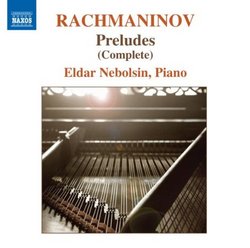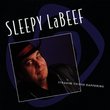| All Artists: Sergey Rachmaninov, Eldar Nebolsin Title: Rachmaninov: Preludes Members Wishing: 0 Total Copies: 0 Label: Naxos Original Release Date: 1/1/2007 Re-Release Date: 5/29/2007 Genre: Classical Styles: Chamber Music, Historical Periods, Classical (c.1770-1830) Number of Discs: 1 SwapaCD Credits: 1 UPC: 747313032778 |
Search - Sergey Rachmaninov, Eldar Nebolsin :: Rachmaninov: Preludes
CD DetailsSimilar CDs
|
CD ReviewsEldar Nebolsin plays Rachmaninov Preludes: Gotta Get This On Dan Fee | Berkeley, CA USA | 08/13/2007 (5 out of 5 stars) "By releasing this additionial disc of the complete Rach piano solo preludes, Naxos competes with itself. Idil Biret blazing her way through the preludes is already available, marred if at all by piano sound that is just a tad bit clangorous. Still, any fan of the preludes must thank his or her lucky stars for this release. Eldar Nebolsin brings his own daunting technique, plus heart and mind and sensuality to these genre pieces. The result is every bit as good as reviewer JSM thinks, my opinion too. The piano sounded as recorded is way better, perhaps thanks to the instrument, perhaps thanks to the recording engineer that Naxos used this time around, and/or perhaps thanks to the venue. Nebolsin is quite a keyboard player. His sheer fluency reminds me of Boris Berezovky, since nothing seems the least bit hard for him. Like Konstantin Sherbakov who has gifted the Naxos catalogue with some fine Rach concerto recordings, Nebolsin brings Slavic Tashkentian soul and folksong phrasings to bear upon the composer's deep wells of melody. His first track sets the pace for the entire set, as he subtilizes the high drama of the famous c-sharp minor prelude which has become so hackneyed, often turned into a cartoon of itself owing to its own wide popularity. Nebolsin doesn't neglect the various bell effects in the least, but he reveals musical perspective and lyricism, aural light and shade so often missing. The rest of the cycle gets equally apt attention, and for once, the Rach preludes seem like a great deal more than background music, or encores in the professional traveling artist's hotel sachel. If I have any reservation at all about Nebolsin's playing on this disc, it passes quickly in small moments when his pedaling blurs some corner of harmony or fingerwork, which if Nebolsin had left clearer would probably amaze us listeners with his extended Russian school piano player's family relationship with the utterly Olympian Arcady Volodos. Indeed, if there were anybody else whom I would rather hear in these preludes, it would have to be Volodos among all current living pianists, but hell will probably freeze over before Sony lets Volodos loose again in less than big pop glitzy sectors of the keyboard literature. Meanwhile, whatever happened, dear Sony, with getting more Schubert Sonatas (and Impromptus?) on disc from Volodos? Yes, the catalogue already brims over with complete sets of preludes by the likes of Ashkenazy, Weissenberg, Moura Lympany, Boris Berezovsky, Dimitri Alexeev - a high fav of my own shelves - Howard Shelley on Hyperion, John Lill - also a fav on my shelves - and as mentioned earlier, Idil Biret on Naxos. Need more? If you love these preludes, Nebolsin will delight. If you love good recorded piano sound, this disc will delight. If you love good playing and good music, period, this disc will delight. Another Naxos winner, then. Recommended on all counts." He May Not Be Richter, But He's in the Top Tier J Scott Morrison | Middlebury VT, USA | 06/30/2007 (5 out of 5 stars) "By most accounts, the complete Rachmaninov Preludes as played by Sviatoslav Richter are at the top of the heap. I have my own personal favorite set by a pianist most have never heard of -- Constance Keene. And there have been marvelous recordings of some or all of the Preludes by such pianists as Ashkenazy, Weissenberg, Alexeev, Cliburn, Ogdon, Berezovsky, Kocsis and, of course, Rachmaninov himself. Still the young Eldar Nebolsin, a 33-year-old born in Tashkent and resident in Madrid, has recorded a formidable entry in the Preludes sweepstakes and the set deserves, in my opinion, to be considered in the top tier of recordings of these marvelous works. I had heard his previous recording of the Chopin B Minor Sonata and although it was excitingly virtuosic, it seemed a bit coolly calculating to me. That is not the case here. Nebolsin gives each of these miniatures their own romantic sound world (as was the case with Keene), characterizing each individually. This is appropriate as each of these pieces has always seemed like a little tone poem to me. (One even wonders if Rachmaninov had a visual image or narrative for each; we'll never know.) The G Flat Major Prelude is aptly dreamy and fluid. Nebolsin takes his time with the ultrafamiliar Prelude in C Sharp Minor, an approach some pianists don't seem to understand is necessary. The C Major Prelude, with its thick writing, is perhaps a little turgid at times but at others it scintillates. The B Minor Prelude is taken a little slower than some play it but it never loses its languid yet subtly insistent forward motion and this, combined with Nebolsin's smart pedaling, seems exactly right. The G Sharp Minor Prelude is urgent and exciting; no rubato is needed or given, Nebolsin making his effects by subtle dynamic adjustments instead. The familiar G Minor Prelude is an elegant Slavic march, with delicate accents rather than the emphatic kind so often heard. The E Major Prelude, one of my favorites, is excitingly dramatic and utterly transparent in spite of the chordal writing. The E Flat Minor Prelude, the one with all those devilish parallel thirds, shimmers in a bright midmorning light. The wistful G Major Prelude will break your heart with its simplicity and yearning. The only performance with which I find much fault is that of the D Major prelude which seems cautious and foursquare; Nebolsin does not make the most of the complex overlapping sonic planes involved. But if I can find major fault with only one of the twenty-four preludes, it seems to me that makes this set a triumph, and I stand by my opinion that this deserves to be ranked high among sets currently available. Add to that the limpid sound captured by the recording engineer, John Taylor, and we have a winner. Recommended with enthusiasm. Scott Morrison " Nebolsin's Rachmaninoff Preludes - A Desert Island CD sawdust | Elgin, Illinois | 11/09/2009 (5 out of 5 stars) "I've encountered many recordings of these pieces. This is a revelation. I feel as if I've been granted a second chance to hear these pieces for the first time.
Nebolsin's technique is never showy - it's a purposeful tool wielded with finesse and restraint. Each of the preludes is treated respectfully - there are no hurried throwaways. In each piece every note plays a role in a carefully revealed conception. Further, each of the preludes seems to flow into the next, to function as parts of a greater whole, as though he's fully aware that listeners have become accustomed to hearing them in order and experiencing the set almost as a single extended composition. Along with a masterful keyboard technique, he makes astonishing use of the sostenuto pedal to bring out melodies I (and perhaps the composer himself) didn't know were there. Moreover, he's playing on a powerful, radiant-sounding instrument, handsomely recorded. This is a real labor of love. A must." |



